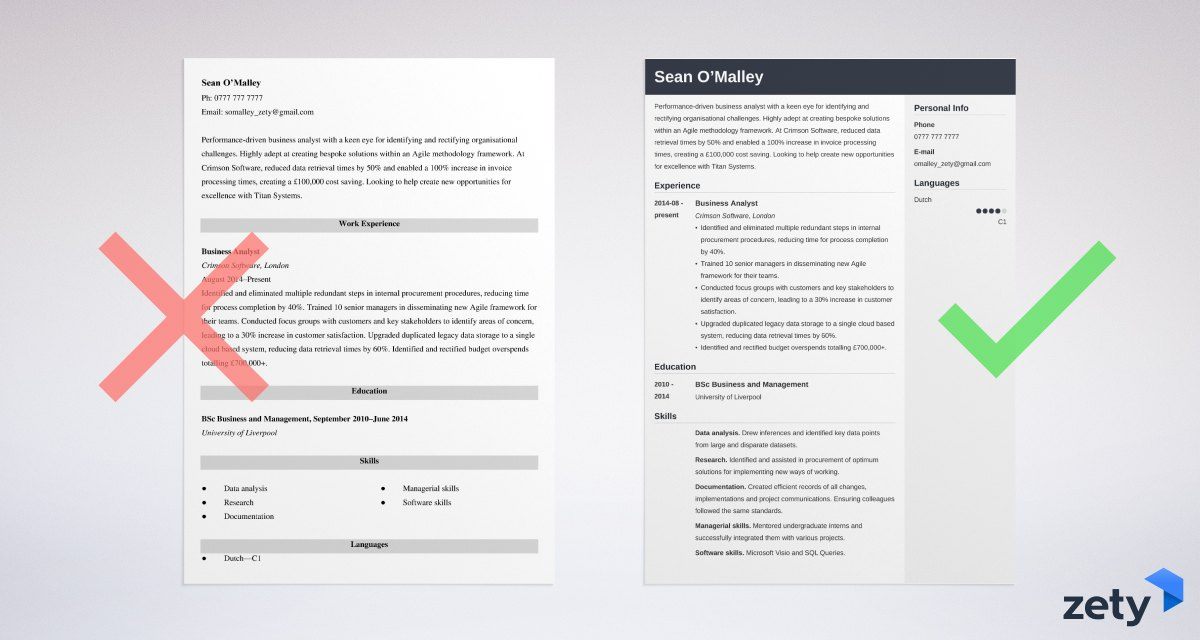What Are Analytical Skills? Meaning and Examples
Create your CV nowAnalytical skills are mentioned in the requirements for all sorts of jobs. It can be pretty tough trying to pin down what they are, and there’s always the fear that your own analytical skills aren’t up to scratch. But we’re here to demystify this often confusing recruitment term.
Read on and you’ll discover:
- What are analytical skills?
- A list of the most desirable analytical skills examples.
- Tips on how to improve your analytical skills.
- And how to include analytical skills on your CV.
Want to save time and have your CV ready in 5 minutes? Try our CV builder. It’s fast and easy to use. Plus, you’ll get ready-made content to add with one click. See 20+ CV templates and create your CV here.
Sample CV made with our builder—See more CV examples here.
And once you’re all clued-up on analytical skills we’ve got plenty of other CV writing guides too.
- What Should a CV Look Like?
- What Personal Details Should Be on a CV?
- Should a CV Be One Page & How to Make it Fit
- Resume vs CV: What’s the Difference?
- References on a CV: Should You Include Them
- Please Find Attached My CV: The Best Way to Say It
- How to Write a CV for Work Experience Opportunities
- Free CV Builder Reviews and Alternatives
- 50+ Essential CV Computer Skills
- 15+ Editable CV Templates for Free Download
Analytical Skills CV Example
Sean O’Malley
Ph: 0777 777 7777
Email: somalley_zety@gmail.com
Performance-driven business analyst with a keen eye for identifying and rectifying organisational challenges. Highly adept at creating bespoke solutions within an Agile methodology framework. At Crimson Software, reduced data retrieval times by 50% and enabled a 100% increase in invoice processing times, creating a £100,000 cost saving. Looking to help create new opportunities for excellence with Titan Systems.
Work Experience
Business Analyst
Crimson Software, London
August 2014–Present
- Identified and eliminated multiple redundant steps in internal procurement procedures, reducing time for process completion by 40%.
- Trained 10 senior managers in disseminating new Agile framework for their teams.
- Conducted focus groups with customers and key stakeholders to identify areas of concern, leading to a 30% increase in customer satisfaction.
- Upgraded duplicated legacy data storage to a single cloud based system, reducing data retrieval times by 60%.
- Identified and rectified budget overspends totalling £700,000+.
Education
BSc Business and Management, September 2010–June 2014
University of Liverpool
Skills
- Data analysis. Drew inferences and identified key data points from large and disparate datasets.
- Research. Identified and assisted in procurement of optimum solutions for implementing new ways of working.
- Documentation. Created efficient records of all changes, implementations and project communications. Ensuring colleagues followed the same standards.
- Managerial skills. Mentored undergraduate interns and successfully integrated them with various projects.
- Software skills. Microsoft Visio and SQL Queries.
Languages
- Dutch—C1
What Are Analytical Skills?
Analytical skills are the skills you use to solve problems. They’re the abilities that let you break information down into smaller sets to draw conclusions. You use analytical skills when spotting patterns, interpreting data, considering new information and making decisions based on those factors.
Good Analytical Skills Examples
Including analytical skills examples on your CV is a must for many different jobs. They’re useful for everything from identifying new business opportunities to making cost savings, spotting problems with processes, and discovering opportunities for improvement.
Here’s a list of strong analytical skills that you could include on your CV.
1. Critical Thinking
Critical thinking is an essential part of showing strong analytical skills and it’s a necessity in every career sector. Critical thinking is the ability to question and challenge ideas, opinions and assumptions that are presented to you. For example, if you’re told a deadline can’t be met, then critical thinking skills will enable you to question and challenge that assertion.
You’d examine why it can’t be done. Then once you know the reasons you can see what could be done to solve the problem, and just as importantly whether it’s worth going to the extra effort. In other words, whether the benefit justifies the cost.
Critical thinking enables you to examine every part of a problem, understand it’s root causes, and try to develop a good solution to it.
2. Data Analysis
As the name suggests, the ability to analyse data and information is an important analytical skill. To solve problems at work you need to be able to examine the information that will help to identify a solution. And you need to be able to find that data in the first place by looking at the right sources and asking the right questions. It’s worth repeating that this isn’t some high level technical skill, it’s used all the time in lots of different jobs. Our pub landlord we discussed above? They were carrying out data analysis.
3. Research
Research skills follow on from data analysis skills. To analyse data you need to have the right information in the first place, that’s where research comes in. It can be as simple as questioning colleagues or customers to find out more about the problem or as complex as combing through business data and statistics. An essential part of the process is being able to identify what data is relevant to solving the problem.
4. Communication
Communication skills are an important soft skill, but they’re also very important when it comes to analytical skills. Communicating with others helps you get the data you need to develop solutions. Then when the solution is developed you need to communicate it to others to implement it. And you need to be able to gather feedback to help troubleshoot and improve the solution once it’s implemented. So the whole process of analysis involves communication.
5. Problem Solving
Once you’ve identified the problem through data analysis, research and communication you need to be able to find a solution. You need to be able to see what the causes of the problem are and identify realistic and cost-effective solutions.
6. Creativity
Creativity is also an important aspect of analytical skills. Finding new solutions to problems involves an element of creativity. The best solution isn’t always the most obvious one. There’s also an element of thinking outside the box in locating different sources of information and identifying different causes of problems. The ability to think creatively forms an essential part of good analytical skills.
7. Forecasting
Forecasting involves analysing past and current data to make predictions for the future. It’s incredibly important when it comes to making critical business decisions. For example, you may need to consider the availability of a product or supply, or whether a product or service sells better at specific times. Good forecasting skills can be make or break for the success of a business or organisation.
8. Organisation Skills
Strong analytical skills and good organisational skills go hand in hand. To carry out effective analysis you need to work in a structured and orderly manner. You may also need to delegate to others and prioritise certain analytical tasks over others. Strong organisational skills ensure efficiency and good communication and work in synergy with other analytical skills to produce better results.
9. Reporting
Once you’ve carried out your analysis you’ll often need to present your findings to others to secure the resources you need to solve problems and justify your solutions. The ability to produce clear and concise reports is an important step in the analytical process.
How to Improve Your Analytical Skills
Improving your analytical skills will pay dividends for your employability and your chances of advancing in your career. They’re such an important transferable skill that you can stand to benefit from improving them no matter what your job. Here’s how to do it.
1. Understand the Meaning of Analytical Skills
In order to improve your analytical skills you’ll need to properly understand what they are. It’s all too common for people to say they have ‘good analytical skills’ on their CV without having the faintest idea what it means. Luckily for you, you’ve just read a great definition of analytical skills, so you’ve got this covered.
2. Exercise Your Mind
Making use of analytical skills requires lots of brain power, but luckily there are plenty of ways of exercising your mind. Play brain training games, read more, do crosswords, anything that helps to improve your thinking abilities. And yes, there is convincing evidence that brain games do help sharpen you up, particularly as you age.
3. Improve Your Mathematical Skills
Being able to effectively work with numbers is a crucial aspect of strong analytical skills. Employers recognise this, and it’s why you’ll often encounter mathematical skills tests as part of the recruitment process for all sorts of jobs. So brush up on your maths skills by signing up for online training or make it fun by playing Sudoku or other numerical reasoning games.
4. Exercise Your Body
There’s a famous Latin phrase, mens sana in corpore sano, which means ‘a healthy mind in a healthy body’. It’s advice that’s almost 2000 years old, but it still applies to today. Eat well and exercise regularly and you’ll be able to think more clearly, therefore improving your analytical skills. Regular exercise actually changes your brain to improve your memory and thinking skills.
5. Practise Your Analytical Skills
The more you analyse, the better you’ll get at it. When you encounter problems at work, analyse their causes and consider solutions. Share these ideas with managers and colleagues. Even if it’s ‘not in your job description’, making the effort will help you to really hone those analytical skills.
6. Question and Clarify
When discussing issues with colleagues and customers, question and clarify to gain more information and a better understanding of what they’re saying. This will help you polish up your research and communication skills and give you more data to analyse and solve problems with.
7. Ask About Training Opportunities
Ask your employer what training opportunities are available to you. Most organisations are aware of the benefits of a well-trained workforce and there may be training opportunities available that you weren’t even aware of.
8. Use Analytical Tools
Develop your hard skills in analysis by familiarising yourself with analytical tools. Spreadsheets, Google Analytics and R programming all form important parts of an analytical toolkit. But working with phone apps in your day-to-day life can also help you with developing your analytical skills. Try budgeting and fitness analysis apps for a fun way of learning how to input and analyse data and see where to make improvements.
When making a CV in our builder, drag & drop bullet points, skills, and auto-fill the boring stuff. Spell check? Check. Start building your CV here.
When you’re done, Zety’s CV builder will score your CV and tell you exactly how to make it better.
How to Include Analytical Skills on Your CV
Once you’ve perfected your analytical skills you need to be able to prove you have them. So next, you’re going to learn how to include analytical skills on your CV, section-by-section.
1. Begin with Your CV Summary
Your CV summary or CV profile introduces you as a candidate. As the name suggests, it summarises the main body of your CV, and recruiters often use it to make a judgment in one quick glance. Mention your analytical skills here to make sure they’re noticed straight away.
Performance-driven business analyst with a keen eye for identifying and rectifying organisational challenges. Highly adept at creating bespoke solutions within an Agile methodology framework. At Crimson Software, reduced data retrieval times by 50% and enabled a 100% increase in invoice processing times, creating a £100,000 cost saving. Looking to help create new opportunities for excellence with Titan Systems.
2. Write an Achievement-Driven Work History
Your CV work experience section is the centrepiece of your job application. Make it impactful by focusing on how your analytical skills have led to making improvements and solving problems. The most effective way to do it is to use accomplishment statements and quantify your achievements with numbers wherever possible.
Business Analyst
Crimson Software, London
August 2014–Present
- Identified and eliminated multiple redundant steps in internal procurement procedures, reducing time for process completion by 40%.
- Trained 10 senior managers in disseminating new Agile framework for their teams.
- Conducted focus groups with customers and key stakeholders to identify areas of concern, leading to a 30% increase in customer satisfaction.
- Upgraded duplicated legacy data storage to a single cloud based system, reducing data retrieval times by 60%.
- Identified and rectified budget overspends totalling £700,000+.
3. Use Your Education Section
Say you’re writing a school leaver CV or an internship CV. You won’t have an extensive work history to draw upon but you can spice up your education section to demonstrate your analytical skills. Mention specific modules or projects where you learned and practised them, or list extracurricular activities that evidence your analytical skills.
BSc Business and Management, September 2010–June 2014
University of Liverpool
- Relevant coursework—Advanced Quantitative Methods, Management Information Systems
4. Target Your CV Skills Section
Your skills section is the traditional place to include your analytical skills. As you’ve seen, they should be interwoven throughout your CV structure and with a little tweaking you can really maximize the impact of your skills section too. Here’s how:
- Read the job advert carefully and write down all of the skills it mentions.
- Then write a list of your own skills and choose 5–10 that match up with the job requirements. These are the skills you should include, as they’ll be perfectly targetted to the job.
- And for added impact, write a brief statement about each skill explaining your proficiency.
Data analysis. Drew inferences and identified key data points from large and disparate datasets.
Research. Identified and assisted in procurement of optimum solutions for implementing new ways of working.
Documentation. Created efficient records of all changes, implementations and project communications. Ensuring colleagues followed the same standards.
Managerial skills. Mentored undergraduate interns and successfully integrated them with various projects.
Software skills. Microsoft Visio and SQL Queries.
Plus, a great cover letter that matches your CV will give you an advantage over other candidates. You can write it in our cover letter builder here. Here's what it may look like:
See more cover letter templates and start writing.
Key Takeaway
Don’t feel intimidated by the meaning of analytical skills. In a nutshell, it’s simply finding and using information to solve challenges and make improvements. They’re also an incredibly versatile skill set that will serve you well throughout your career, regardless of what job you do. So take the time to improve your analytical skills and practise them at every opportunity. And for a perfect CV, include evidence of your analytical skills throughout.
Thanks for reading. If there’s anything else you’d like to know about how to prove your analytical skills on your CV then please let us know in the comments below.
About Zety’s Editorial Process
Our editorial team has thoroughly reviewed this article to ensure it follows Zety’s editorial guidelines. Our dedication lies in sharing our expertise and providing you with actionable career advice that offers you real value. Every year, the quality of our content attracts 40 million readers to our site. But that’s not all – we conduct original research to gain a detailed understanding of the labour market. We take pride in being cited by top universities and leading media outlets in the UK and worldwide.






